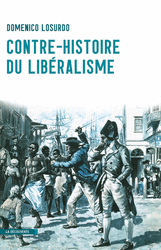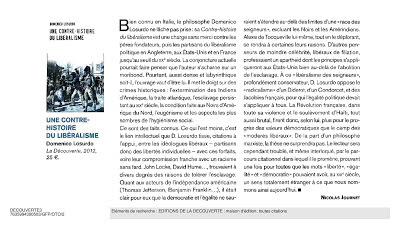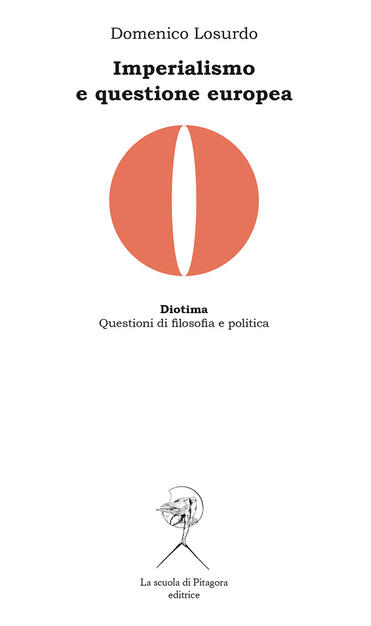Le libéralisme continue aujourd'hui d'exercer une influence décisive sur
la politique mondiale et de jouir d'un crédit rarement remis en cause.
Si les « travers » de l'économie de marché peuvent à l'occasion lui être
imputés, les bienfaits de sa philosophie politique semblent évidents.
Il est généralement admis que celle-ci relève d'un idéal universel
réclamant l'émancipation de tous. Or c'est une tout autre histoire que
nous raconte ici Domenico Losurdo, une histoire de sang et de larmes, de
meurtres et d'exploitation. Selon lui, le libéralisme est, depuis ses
origines, une idéologie de classe au service d'un petit groupe d'hommes
blancs, intimement liée aux politiques les plus illibérales qui soient :
l'esclavage, le colonialisme, le génocide, le racisme et le mépris du
peuple.
Dans cette enquête historique magistrale qui couvre trois siècles, du XVIIe au XXe siècle, Losurdo analyse de manière incisive l'oeuvre des principaux penseurs libéraux, tels que Locke, Burke, Tocqueville, Constant, Bentham ou Sieyès, et en révèle les contradictions internes. L'un était possesseur d'esclaves, l'autre défendait l'extermination des Indiens, un autre prônait l'enfermement et l'exploitation des pauvres, un quatrième s'enthousiasmait de l'écrasement des peuples colonisés... Assumer l'héritage du libéralisme et dépasser ses clauses d'exclusion est une tâche incontournable. Les mérites du libéralisme sont trop importants et trop évidents pour qu'on ait besoin de lui en attribuer d'autres, complètement imaginaires.
Dans cette enquête historique magistrale qui couvre trois siècles, du XVIIe au XXe siècle, Losurdo analyse de manière incisive l'oeuvre des principaux penseurs libéraux, tels que Locke, Burke, Tocqueville, Constant, Bentham ou Sieyès, et en révèle les contradictions internes. L'un était possesseur d'esclaves, l'autre défendait l'extermination des Indiens, un autre prônait l'enfermement et l'exploitation des pauvres, un quatrième s'enthousiasmait de l'écrasement des peuples colonisés... Assumer l'héritage du libéralisme et dépasser ses clauses d'exclusion est une tâche incontournable. Les mérites du libéralisme sont trop importants et trop évidents pour qu'on ait besoin de lui en attribuer d'autres, complètement imaginaires.
NICOLAS JOURNET su "Sciences Humaines", fevr. 13

















3 commenti:
According to Franz Oppenheimer, the course of history is dominated by a running battle between the "political means" of acquiring goods and the "economic means" to this end: men may acquire goods either by production and exchange - the economic means - or by imposing their rule on others and taking their products from them - the political means.
The latter represents coercion, organized as the state, to enforce a tribute, and stands for tyranny and exploitation. The political means enters history through the nomads, who fell upon agricultural tribes, seized their lands, and, instead of massacring them, enslaved them for the cultivation of those lands. Such a system, however, cannot be perpetuated, much less be made more efficient, without increasingly taking into account the interests of the ruled and thus preserving their ability and willingness to produce. The original robber state thus gradually shades off into the modern state, without giving up its identity.
The economic means stands for reason, liberty and equality. It constitutes the exchange economy, which presupposes personal freedom and equal rights, and benefits all partners. Every able man works for himself and owns his land or tools - individually in a pre-industrial technique of production; through a cooperative where large-scale production makes this necessary - and all these workers so distribute and redistribute themselves among the different occupations as to equalize annual returns from the exchange of products. Oppenheimer's interest is never focused on the isolated price of a product, but always on the income derived from that price.
The exchange economy becomes perverted by a compromise with the slave economy. In the "pure economy" no one could dream of appropriating more land than he and his family could till; such appropriation presupposes a slave system. Yet the exchange economy did tolerate great landed property, that economic institution of the political means, as legitimate and on an equal footing with property arising from work personally done. In the hybrid system which combines the transformed feudal property with the exchange economy - this is the definition of capitalism - harmony is distorted by two interrelated effects of great landed (feudal) property: the countryside's purchasing power for urban products is weakened by exploitation and ensuing inefficiency; and the urban labor market is flooded, and wages pressed down, by the slaves or serfs or agricultural workers who escape from pressure into the freedom of the cities.
In a harmonious system, where the land is not appropriated, an urban worker would demand and get as much as he could otherwise receive as an independent peasant on free land; in the hybrid structure the wage is pressed down to that of an agricultural serf. This makes urban capital property a means of exploitation alongside great landed property: the propertyless suffers a deduction from his rightful wage, the product of his work, to the profit of the big owners. In this way Oppenheimer introduces his exploitation theory.
According to Franz Oppenheimer, the course of history is dominated by a running battle between the "political means" of acquiring goods and the "economic means" to this end: men may acquire goods either by production and exchange - the economic means - or by imposing their rule on others and taking their products from them - the political means.
The latter represents coercion, organized as the state, to enforce a tribute, and stands for tyranny and exploitation. The political means enters history through the nomads, who fell upon agricultural tribes, seized their lands, and, instead of massacring them, enslaved them for the cultivation of those lands. Such a system, however, cannot be perpetuated, much less be made more efficient, without increasingly taking into account the interests of the ruled and thus preserving their ability and willingness to produce. The original robber state thus gradually shades off into the modern state, without giving up its identity.
The economic means stands for reason, liberty and equality. It constitutes the exchange economy, which presupposes personal freedom and equal rights, and benefits all partners. Every able man works for himself and owns his land or tools - individually in a pre-industrial technique of production; through a cooperative where large-scale production makes this necessary - and all these workers so distribute and redistribute themselves among the different occupations as to equalize annual returns from the exchange of products. Oppenheimer's interest is never focused on the isolated price of a product, but always on the income derived from that price.
The exchange economy becomes perverted by a compromise with the slave economy. In the "pure economy" no one could dream of appropriating more land than he and his family could till; such appropriation presupposes a slave system. Yet the exchange economy did tolerate great landed property, that economic institution of the political means, as legitimate and on an equal footing with property arising from work personally done. In the hybrid system which combines the transformed feudal property with the exchange economy - this is the definition of capitalism - harmony is distorted by two interrelated effects of great landed (feudal) property: the countryside's purchasing power for urban products is weakened by exploitation and ensuing inefficiency; and the urban labor market is flooded, and wages pressed down, by the slaves or serfs or agricultural workers who escape from pressure into the freedom of the cities. In a harmonious system, where the land is not appropriated, an urban worker would demand and get as much as he could otherwise receive as an independent peasant on free land; in the hybrid structure the wage is pressed down to that of an agricultural serf. This makes urban capital property a means of exploitation alongside great landed property: the propertyless suffers a deduction from his rightful wage, the product of his work, to the profit of the big owners. In this way Oppenheimer introduces his exploitation theory.
It can be seen from this all too brief sketch why Oppenheimer calls himself a liberal socialist. He is a socialist in that he regards capitalism as a system of exploitation, and capital revenue as the gain of that exploitation, but a liberal in that he believes in the harmony of a genuinely free market. He parts from apologetic bourgeois liberalism in that he denies the harmonious character of the existing market, vitiated as it is by the foreign body, feudal property; only if this were rooted out would the cooperative and equilibrating character of the market assert itself. This position is unassailable in formal logic, like the rival positions of Malthus-Ricardo and of Marx. Faced with the disillusionment of the exuberant hopes that had accompanied the rise of the liberal economy, Malthus and Ricardo blamed the outcome on the scantiness of nature, as manifested in decreasing returns; Marx on the dynamics of bourgeois property; Oppenheimer on the incomplete character of the bourgeois revolution, which made a compromise with feudal property and thereby established capitalism as a "bastard of serfdom and liberty."
http://www.franz-oppenheimer.de/eh44a.htm
Posta un commento